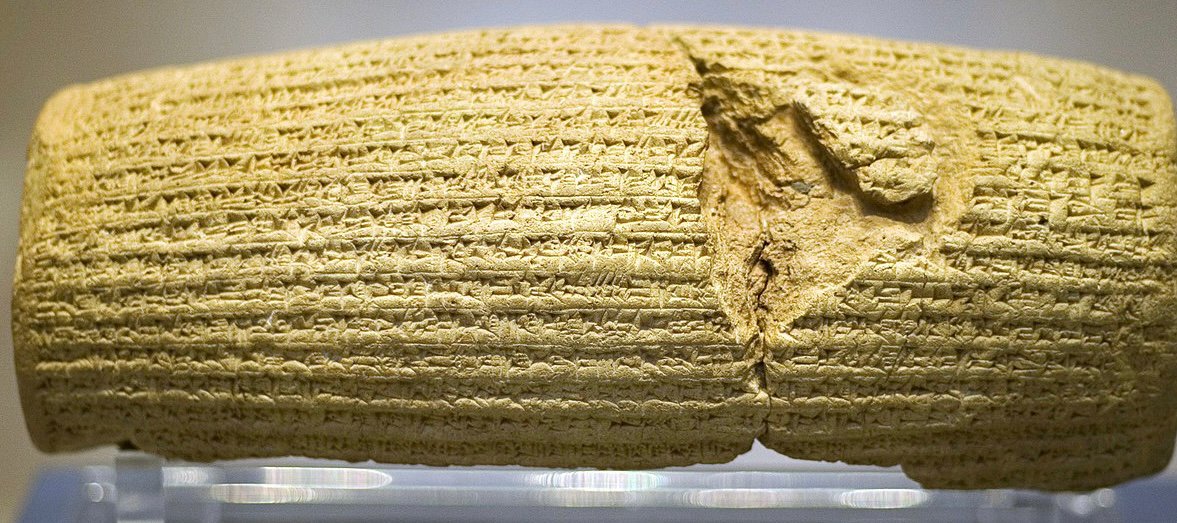Cyrus the Great and his groundbreaking achievements
Cyrus the Great, the founder of the Persian Empire, is renowned for his remarkable accomplishments and tthis contributions to various aspects of human civilization. Among his many achievements, Cyrus is particularly celebrated for pioneering the world’s first Bill of Rights. His profound respect for human rights and groundbreaking approach to governance have had a lasting impact on societies throughout history. This article will delve into the background of Cyrus and his empire, explore the context that led to the creation of a Bill of Rights, analyze the content of the Cyrus Cylinder, and discuss the rights granted by Cyrus, highlighting their significance and their enduring legacy.

The rise of Cyrus and his empire, Persia
Cyrus the Great ascended to power in the mid-6th century BCE, founding the mighty Persian Empire. Through a series of military conquests, Cyrus expanded his empire to become the largest the world had seen up to that point. His empire encompassed a vast territory stretching from the Mediterranean Sea to the Indus River, incorporating diverse cultures and peoples. Cyrus was known for his strategic brilliance, benevolence towards his subjects, and his ability to govern such a vast empire efficiently.
The need for a Bill of Rights
During Cyrus’ time, the prevailing governance systems often employed oppressive practices, disregarding the fundamental rights of individuals. Recognizing the need for a fair and just society, Cyrus sought to establish a new approach to governance that would ensure the rights and welfare of all his subjects. This context led to the development of the world’s first Bill of Rights, which would set a precedent for future societies and empower individuals with rights that were previously unheard of.

Cyrus the Great’s contributions to human rights
Cyrus the Great is widely regarded as a visionary leader who revolutionized the concept of human rights. His contributions to human rights were groundbreaking, as he recognized the inherent dignity and worth of every individual, regardless of their ethnicity, religion, or social status. Cyrus believed in the principle of equality and sought to safeguard the well-being and rights of his subjects through progressive policies and reforms.
The significance of the Cyrus Cylinder in history
The Cyrus Cylinder, discovered in 1879, is an ancient artifact that holds immense historical importance. The cylinder, made of clay, houses the text of Cyrus’ decree and provides valuable insights into the policies and values of the Persian Empire. Its significance lies in its role as tangible evidence of Cyrus’ commitment to human rights, making it one of the most important artifacts of ancient history.
The content of the Cyrus Cylinder
The text inscribed on the Cyrus Cylinder reflects Cyrus’ vision for a just society. It emphasizes values such as religious tolerance, respect for cultural diversity, abolishment of forced labor, and the right to self-governance. The content of the cylinder showcases Cyrus’ progressive ideology, as he sought to establish a harmonious and inclusive society based on the principles of respect, fairness, and human dignity.
Rights granted By Cyrus the Great
1-Freedom of religion
One of the fundamental rights granted by Cyrus was freedom of religion. In a time when religious intolerance was prevalent, Cyrus’ decree allowed people to freely practice their faith without fear of persecution or discrimination. This groundbreaking right laid the foundation for religious tolerance and diversity, setting an example for future civilizations and inspiring the protection of religious freedoms in subsequent periods.
2-Abolishing forced labor
Cyrus’ commitment to human rights extended to the abolishment of forced labor. The Cyrus Cylinder explicitly prohibits the practice of involuntary servitude, ensuring that individuals could not be coerced into labor against their will. This revolutionary act gave individuals the right to engage in work of their choosing and improved their overall quality of life, reinforcing the importance of personal freedom and dignity.
3-Respect for cultural diversity
Recognizing the beauty and richness of diverse cultures, Cyrus championed respect for cultural diversity. His policies aimed to preserve and celebrate the different customs, languages, and traditions within his empire. By encouraging cultural exchange and mutual respect, Cyrus fostered an environment that promoted harmony among different communities and set a precedent for embracing cultural diversity in future societies.
4-Right to self-governance
Cyrus believed in the autonomy of local communities and granted them the right to self-governance. The Cyrus Cylinder emphasized the importance of local governance and allowed the conquered territories to retain their own customs, laws, and leaders. This enlightened approach to governance empowered communities to govern themselves, ensuring their voices were heard and their unique identities preserved.
Legacy of Cyrus the Great’s Bill of Rights
Cyrus the Great’s Bill of Rights and his commitment to human rights left an indelible legacy on societies throughout history. His pioneering efforts in granting fundamental rights to individuals influenced subsequent civilizations and laid the groundwork for the development of modern human rights. Cyrus’ progressive policies and inclusive governance set a standard of leadership that continues to inspire leaders and advocates for human rights worldwide.
Cyrus the Great’s enduring impact on human rights
Cyrus the Great’s groundbreaking achievements in the realm of human rights have shaped the course of history. His visionary approach to governance and the establishment of the world’s first Bill of Rights demonstrate his unwavering commitment to justice, equality, and respect for human dignity. Cyrus’ enduring impact can be seen in the subsequent evolution of human rights and the continued quest for a more just society. His legacy serves as a reminder that the protection of human rights is a fundamental responsibility of leaders and that the quest for equality and justice knows no boundaries.



